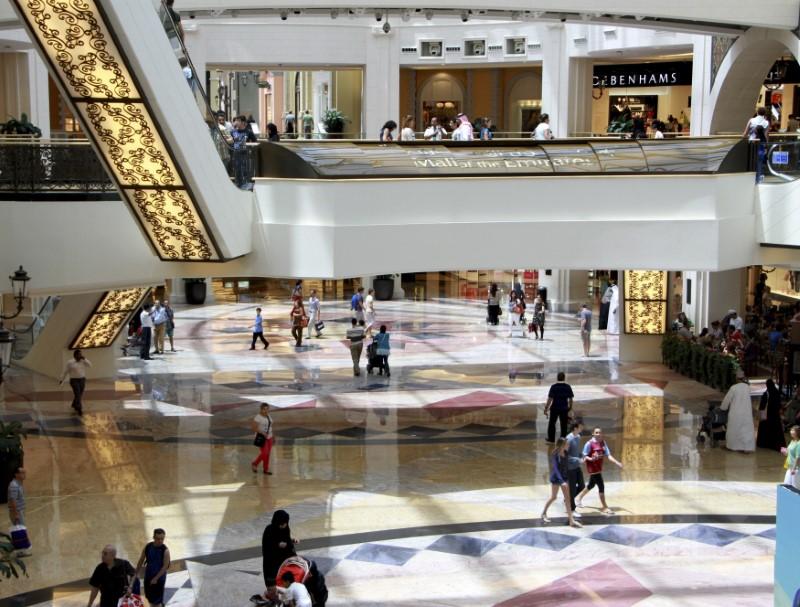
The Mall of the Emirates in Dubai. (Reuters)
The consumer retail market is always dynamic, always changing. But maybe now, especially in the Middle East, it is changing faster and more unpredictably than ever, and companies in this sector are going to have to stay on their toes to avoid getting left behind.
This is the central message of a new piece of research by those smart people at McKinsey & Co., the consulting firm to kings and presidents throughout the world. In fact, McKinsey calls the current climate in the region’s retail industries “the perfect storm,” with consumers changing their buying habits arbitrarily and companies buffeted by commercial and technological factors largely outside of their control.
The most adaptable will survive and thrive, the rest “will get left behind,” said McKinsey.
Its report is based on an online survey of 2,000 consumers in Saudi Arabia and the UAE, the two biggest economies in the Arabian Gulf region. It shows a buying public that is increasingly price conscious, where brand loyalty is steadily eroding, and more ready to go online rather than head to the mall.
Some 80 percent of the survey sample in both countries are worried about losing their jobs, while half of those said they are cutting down spending and paying closer attention to prices. We already had an idea this was the case, with VAT, higher utility costs and expatriate visa fees, but to see the stark figures is striking.
Shoppers are more conscious of health and wellness factors when making their choices; they are increasingly distrustful of ‘Big Food’ companies and want local produce when possible
Frank Kane
At the same time, shoppers are more conscious of health and wellness factors when making their choices; they are increasingly distrustful of “Big Food” companies and want local produce when possible.
It is not a generational thing either. McKinsey found that across the three main demographics — Generation X, millennials and baby boomers — roughly the same proportion (57 percent) want “all-natural ingredients,” with a large number insisting bizarrely on “real sugar, not substitutes.”
It is a market in which organic, “natural” products are likely to thrive, niche manufacturers will flourish, and existing operators will have to adjust. But, concludes McKinsey, many incumbents have not done that.
“As a consequence, for most retailers and consumer-packaged-goods (CPG) manufacturers in the region, revenue growth has stalled or even fallen: In the past year, luxury retailers’ sales declined by 3 percent on average, while large grocers’ sales declined by 3 to 8 percent,” the consulting firm said.
Added to this capricious market is the apparently unstoppable rise of e-commerce. Firms such as Souq, Noon and Namshi have been slowly luring customers away from the stores, but they still only account for 2.5 percent of retail in the region. This is expected to double by 2022, far outstripping growth in traditional brick-and-mortar retailing.
What can the corporates do in this challenging environment? McKinsey said they have to adopt a new strategy, based on offering consumers a new and distinct value proposition, combined with a “relentless” push on productivity.
They will be able to achieve this by using new digital capabilities, honing their analytical skills, and consolidating the sector via mergers and acquisitions.
For example, supermarket chains can no longer simply stack the shelves with everything and hope the customers see something they want. They have to fine-tune their product display, make greater use of pricing and promotions techniques, and personalize their product offerings.
The latter in particular will yield big benefits, McKinsey says, especially in online shopping, citing the example of cosmetics chain Sephora which gets $6.50 return for each $1 spent on “similar items” or “often bought together” offerings.
Costs have to be kept under control by smarter techniques across all aspects of operations.
One leading grocery chain reduced shrinkage (lost product due to shoplifting or employee theft) by 33 percent by streamlining its replenishment and ordering processes. Similarly, warehousing and distribution are suitable cases for technology-aided savings. “Big data” analytics can be used across the board.
Above all, companies should strive to achieve economies of scale by consolidating the corporate structures of their business. This has already begun, with the likes of Majid Al Futtaim’s acquisitions of Geant operations in the region, as well as the takeovers of Souq and Namshi by Amazon and Emaar respectively.
The volatile retail environment is the “new normal” in the region, McKinsey said, and as usual the race will go to the fastest and most flexible.
- Frank Kane is an award-winning business journalist based in Dubai. Twitter: @ frankkanedubai

